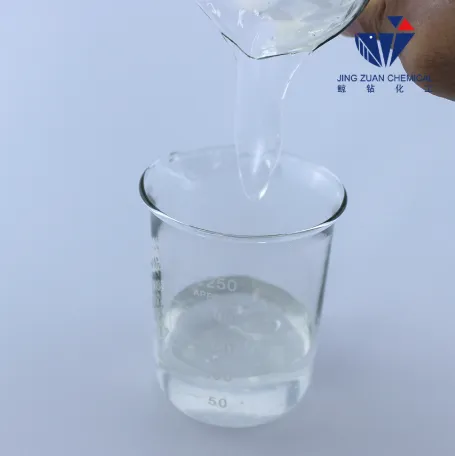
Feb . 21, 2025 16:07 Retounen nan lis la
HPMC: The Role of Molecular Weight and Hydroxypropyl Content
When it comes to selecting the right HPMC (Hydroxypropyl Methylcellulose) grade for your formulations, understanding the impact of molecular weight and hydroxypropyl content is crucial. The unique properties of HPMC make it an ideal ingredient for a wide range of industries, including detergents, pharmaceuticals, cosmetics, and construction. However, not all HPMC grades are the same, and the key factors that differentiate them are molecular weight and hydroxypropyl content. These two elements influence solubility, viscosity, and overall performance in different applications.

Molecular Weight and Solubility of HPMC
One of the most significant factors to consider when choosing HPMC is its molecular weight. Higher molecular weight grades of HPMC tend to have lower solubility in water compared to their lower molecular weight counterparts. This means that higher molecular weight HPMC may take longer to dissolve or form a viscous solution, which could affect the application and performance of the product.
For example, in detergents, lower molecular weight HPMC grades are typically preferred as they offer quicker solubility and easier incorporation into the product. On the other hand, higher molecular weight HPMC grades are better suited for applications requiring higher viscosity, such as in pharmaceutical formulations or construction materials like mortar and cement.
As a HPMC supplier, it is essential to match the correct molecular weight grade to the intended application to optimize the performance and efficiency of the final product. Understanding how molecular weight affects solubility and viscosity is key in ensuring that HPMC delivers its full potential in each specific use case.
Hydroxypropyl Content: Impact on Solubility and Performance
Another important factor that influences the solubility and viscosity of HPMC is the hydroxypropyl content. Hydroxypropyl groups are substituted onto the cellulose structure to increase the solubility of HPMC in water. The higher the hydroxypropyl content, the better the solubility of HPMC, especially in cold water.
When selecting HPMC for specific applications like detergents, a higher hydroxypropyl content ensures that the product will dissolve more efficiently and create a smoother, more uniform solution. This is particularly important in formulations where solubility is a critical factor, such as in cleaning products, adhesives, or paints.
In contrast, lower hydroxypropyl content grades might be more suitable for applications where solubility isn’t the primary concern, and higher viscosity or gel strength is desired. These grades can still offer excellent performance in construction and pharmaceutical formulations where a thicker consistency is needed but with less emphasis on quick solubility.
HPMC Uses in Detergents: Key Ingredient for Enhanced Performance
One of the most notable HPMC uses is in the formulation of detergents. Whether in liquid or powdered detergents, HPMC plays a critical role in enhancing viscosity, improving suspension properties, and optimizing spreadability. In detergent formulations, HPMC helps to ensure that the active cleaning agents are evenly distributed, providing consistent cleaning results.
As discussed earlier, the hydroxypropyl content of HPMC directly influences its solubility in water, which is crucial for detergents that need to dissolve quickly in both cold and hot water. Additionally, HPMC helps stabilize the detergent mixture by preventing separation of active ingredients. Higher molecular weight grades of HPMC offer increased viscosity, helping to create thicker, more effective detergent solutions that cling better to surfaces for improved cleaning.
Because HPMC is non-toxic and biodegradable, it is an ideal ingredient for eco-friendly detergent formulations, making it an important component in modern green cleaning products. As a versatile polymer, HPMC adds value to both liquid and powdered detergents, improving performance without compromising on safety.
HPMC Viscosity: How It Affects Product Performance
Viscosity is another key performance characteristic that is influenced by both molecular weight and hydroxypropyl content. HPMC viscosity determines how thick or thin the final product will be, which is especially important in applications such as pharmaceuticals, adhesives, and construction materials.
For HPMC to be effective in applications requiring a thick, gel-like consistency (such as in pharmaceutical tablet coatings or mortars), higher molecular weight grades with higher viscosity are often required. This ensures that the final formulation has the desired thickness and can be applied smoothly.
On the other hand, in applications where a lighter or more fluid consistency is desired, lower molecular weight HPMC grades are preferred due to their lower viscosity. For instance, in detergent formulations, low-viscosity HPMC allows for faster spreading and quick dispersion in water, improving the product's ease of use.
As a HPMC supplier, it is crucial to understand the specific viscosity requirements for each application to ensure optimal product performance. Whether you are formulating construction adhesives or personal care products, the right HPMC viscosity can make all the difference in achieving the desired texture, spreadability, and stability.
Tailoring HPMC for Every Need
To sum up, HPMC is a versatile ingredient that offers numerous benefits across various industries, but its performance is highly dependent on the molecular weight and hydroxypropyl content. By carefully selecting the right HPMC grade, manufacturers can optimize the viscosity, solubility, and stability of their products, ensuring that they meet the specific requirements of each application.
Whether you're developing detergents, pharmaceuticals, or construction materials, HPMC is an essential ingredient that can significantly enhance product quality and performance. If you're in need of high-quality HPMC for your formulations, visit our website to explore our range of HPMC products that meet the highest standards of quality and consistency.
-
Versatile Hpmc Uses in Different Industries
NouvèlJun.19,2025
-
Redispersible Powder's Role in Enhancing Durability of Construction Products
NouvèlJun.19,2025
-
Hydroxyethyl Cellulose Applications Driving Green Industrial Processes
NouvèlJun.19,2025
-
Exploring Different Redispersible Polymer Powder
NouvèlJun.19,2025
-
Choosing the Right Mortar Bonding Agent
NouvèlJun.19,2025
-
Applications and Significance of China Hpmc in Modern Industries
NouvèlJun.19,2025







